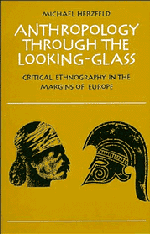Book contents
- Frontmatter
- Contents
- Preface
- Key to symbols
- 1 Romanticism and Hellenism: burdens of otherness
- 2 A secular cosmology
- 3 Aboriginal Europeans
- 4 Difference as identity
- 5 The double-headed eagle: self-knowledge and self-display
- 6 Strict definitions and bad habits
- 7 The practice of relativity
- 8 Etymologies of a discipline
- Notes
- Bibliography
- Index
8 - Etymologies of a discipline
Published online by Cambridge University Press: 11 March 2010
- Frontmatter
- Contents
- Preface
- Key to symbols
- 1 Romanticism and Hellenism: burdens of otherness
- 2 A secular cosmology
- 3 Aboriginal Europeans
- 4 Difference as identity
- 5 The double-headed eagle: self-knowledge and self-display
- 6 Strict definitions and bad habits
- 7 The practice of relativity
- 8 Etymologies of a discipline
- Notes
- Bibliography
- Index
Summary
… in every language the words that are needed in the cultivated arts and arcane sciences are of peasant origin.
Vico 2,2,2,1 (1977:284) (B/F 404)Etymology and discipline
In this book, I have attempted the exploratory etymology of an academic discourse. But I have not done so by considering in much detail the origins of anthropological thought as such: that has been the task of the discipline's numerous historians. Instead, I have explored the ethnography of a particular place, modern Greece, whose relative absence from the disciplinary canon ought in my judgment to occasion some considerable but ultimately critical bewilderment.
The object of this pursuit has by stages turned out to be a mocking shadow of the etymology of the discipline, a parallel outer form with an opaque interior, a theory inhabited by unruly practitioners. The modern Greek nation-state is a creation of the same Eurocentric lust for self definition that also generated anthropology during roughly the same period. Unlike anthropology, however, which at first could easily afford to pontificate about radically exotic others and only haltingly came to realize that this was not consistent with ethnographic experience, the Greeks from the beginning have found it necessary to come to terms with an official discourse and ideology that rejected many of the most familiar aspects of indigenous culture as foreign, exotic, and flawed. The Greeks' social life, which generates so many of their self-stereotypes as rebellious and uncontrollable lovers of independence, constantly conflicted with the official forms and norms. Their dependence on the West made the Greeks strangers in their own land at a time when the task of anthropologists was merely to represent strangers to their own compatriots.
- Type
- Chapter
- Information
- Anthropology through the Looking-GlassCritical Ethnography in the Margins of Europe, pp. 186 - 205Publisher: Cambridge University PressPrint publication year: 1988



